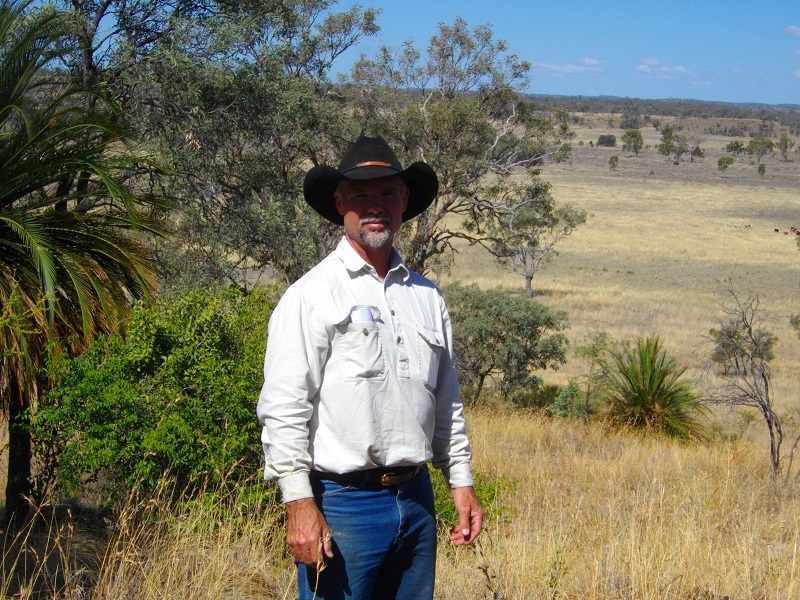
Dennis Donohoe, farm manager with Aminya Pastoral, is a seasoned producer with decades of experience, and his story is a testament to how even minor changes in farming practices can lead to significant improvements in productivity and land health.
Location: Springsure, Central Queensland
Property size: 3,238 hectares
Currently runs: 1200 LSU
Average annual rainfall: 600mm
Enterprise: Beef cattle agistment
Achievements:
Drivers of Success:
Ideas for future innovation:
RCS services used:
When the Lavel family took hold of Kelvin Downs in 2002, it was in a state of ecological decline. The beef cattle farm in Central Queensland was showing typical symptoms of limited watering points and heavy and continuous grazing management. Armed with a lot of ambition to create an improving ecosystem and a flourishing business, Mick Lavel got to work making changes and expanding his knowledge.
The same year the Lavels purchased Kelvin Downs, Mick attended the RCS Grazing Clinic and began expanding his knowledge. This accelerated a new level of thinking, which allowed other vital changes to unfold.
After completing the RCS Grazing Clinic, Mick went on to do GrazingforProfit®, followed by ExecutiveLink®, committing years to learning before graduating in 2009. Whilst studying, the Lavels’ business gained a lot of momentum from the support, inspiration, networking, accountability, and idea-sharing Mick found at RCS.
A firm believer that we cannot continue to sacrifice the health of the land to get an income, Mick thought long-term and accepted the time it would take to reap the rewards of his efforts.

Mick is a builder by trade, spending approximately half of his time off-farm, meaning Kelvin Downs needed to be a simple and low-maintenance operation. The systems he applied allow the land to regenerate with minimal human input, modelling systems that would occur in nature. The time they do spend working on the land is highly strategic. Kelvin Downs now utilises:
Kelvin Downs has undergone dramatic ecological improvements since the Lavels purchased the land in 2002. Strong advocates for taking meaningful ecological measurements, the Lavels record plant basal area, ground cover percentages, average annual LSU’s, Stock Days per Hectare per 100mm rainfall (SDH/100mm) and rolling rainfall. Pasture budgeting and photo monitoring also show the family when they are making progress in the ecosystem. Some of the benefits the Lavels have noted include:
The positive results from these new practices encouraged the family to purchase two neighbouring properties. The aggregation is now 3,238 hectares, divided into 265 paddocks.
With so much progress already made, the Lavels are rightfully making big plans for the future. Mick aims to increase complementary enterprises such as pigs and chickens, introducing free-range animals to mimic natural patterns. The family also aspires to create a learning or community centre at Kelvin Downs that allows people from cities to connect and learn about food production and the ecosystem, closing the divide between rural and urban communities.
Everything the Lavels do in their business aims to build an operation that improves soil biology, creating healthy food and healthy people. They have been able to persist in challenging times by staying focused, increasing knowledge and concentrating on continual personal development. This dedication to a good headspace will be carried into the future of Kelvin Downs for as long as Mick is at the helm.
Profitable Paddocks is our educational newsletter sent to your email inbox every quarter.
Click the Bell for the latest blogs.

Dennis Donohoe, farm manager with Aminya Pastoral, is a seasoned producer with decades of experience, and his story is a testament to how even minor changes in farming practices can lead to significant improvements in productivity and land health.
Once you have ownership as to why planning is important, the next ingredient is to work out where and how you will do your planning. When you write something down you change your relationship with the content. I cannot emphasise enough the power of getting your thoughts and plans out of your head onto paper or the computer.
The season in SA and Tassie is particularly tight right now with little or no useful rain since early January and a generally failed 2023 spring prior to that. Right now, across southern Australia and much of the eastern NSW, you won’t need to drive far out into the countryside to see cattle and sheep grazing (and lying on) hay and silage trails lined across paddocks.
Martha Lindstad and partner Robert James are farm managers on ‘Karalee’, Enngonia NSW. Both have travelled different paths to being where they are. Martha is originally from Norway, growing up on a three hectare farm before travelling to New Zealand and eventually the Pilbara in Western Australia. It was here that she saw the benefits of sustainable farming for the country and livestock.
The Prince’s RCS mentor, Raymond Stacey, sees a strong future ahead for Simon and Laura. “The Drought Resilient Soils and Landscapes project is about supporting graziers to manage their country and businesses better,” Raymond said. “I see an operation here where they’re working hard on their planning and putting their plans into action to leave their country, business and people in better shape.”

Join our mailing list
